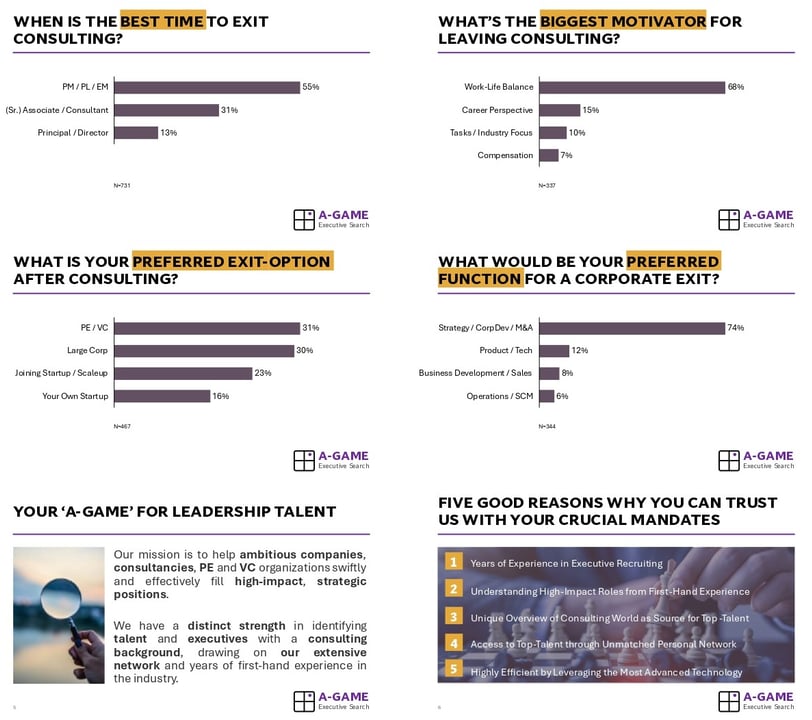Navigating the Consulting Exit: Insights from Recent Polls
Transitioning from a consulting career is a pivotal decision influenced by various factors, including career aspirations, work-life balance, and preferred industries. Recent polls conducted by A-GAME | Executive Search among current and former consultants shed light on these considerations, offering valuable insights for those contemplating their next career move.
Daniel Cremer
3/25/20251 min read
Optimal Timing for Departure
The data reveals that over half of the respondents consider the Project Manager (PM, PL, EM) level as the ideal point to exit consulting. This stage typically involves leading teams and managing assignments, providing professionals with essential leadership experience that proves advantageous in subsequent roles. As noted by Daniel Cremer, Managing Director at A-GAME | Executive Search, this leadership exposure better prepares individuals for future executive positions.
Pursuit of Work-Life Balance
A significant 68% of participants cited the desire for a better work-life balance as the primary motivation for leaving consulting. While consulting roles are renowned for their demanding hours and extensive travel, many exit opportunities, such as positions in private equity or venture capital, may still entail long hours. However, these roles often offer greater stability and reduced travel commitments, contributing to an improved overall quality of life.
Preferred Industries for Transition
When exploring new sectors, respondents displayed varied preferences:
Private Equity (PE) and Venture Capital (VC): A narrow majority favored transitions into PE or VC firms, attracted by the dynamic and financially rewarding nature of these industries.
Large Corporations vs. Startups: The remaining participants were almost evenly split between joining large corporations and entering the startup ecosystem, each offering distinct challenges and growth opportunities.
Functional Roles Within Corporations
For those opting to join large corporations, a substantial 74% expressed a preference for staff functions such as Strategy, Corporate Development, and Mergers & Acquisitions (M&A). These roles are perceived as natural extensions of consulting work, characterized by project-driven tasks, diversity, and steep learning curves. Conversely, fewer respondents showed interest in traditional line functions like Product Management, Technology, Business Development, Sales, Operations, or Supply Chain Management.
Conclusion
Deciding when and where to transition from a consulting career is a multifaceted process that hinges on individual goals and lifestyle considerations. The insights from these polls underscore the importance of strategic planning and self-assessment in navigating this significant career shift. For personalized guidance and access to a network of opportunities tailored to professionals with consulting backgrounds, A-GAME | Executive Search offers expertise and support to ensure a successful transition.
#ConsultingExit #CareerTransition #WorkLifeBalance #PrivateEquity #VentureCapital #CorporateStrategy #ExecutiveSearch #AGAMEExecutiveSearch
Connect
Partnering with you for exceptional leadership solutions.
contact@a-game-search.com
© 2024. All rights reserved.

